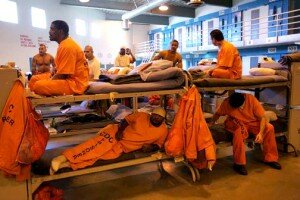 Dear Obama Administration, instead of having our Drug Czar focus on addiction recovery and prevention programs, how about changing the policy of our racialized criminal justice system that has used the "War on Drugs" policy to put more Black males in the criminal justice system than slavery in 1850?
Dear Obama Administration, instead of having our Drug Czar focus on addiction recovery and prevention programs, how about changing the policy of our racialized criminal justice system that has used the "War on Drugs" policy to put more Black males in the criminal justice system than slavery in 1850?
Around this time last year, the Obama Administration's Drug Czar, Gil Kerlikowske said he wants to banish the idea that the U.S. is fighting "a war on drugs," which is a move that favors treatment over mass incarceration. While this approach is being taken, more than 60% of the people in prison are now racial and ethnic minorities. For Black males in their twenties, 1 in every 8 is in prison or jail on any given day. These trends have been intensified by the disproportionate impact of the "war on drugs," in which three-fourths of all persons in prison for drug offenses are people of color, according to a report by The Sentencing Project.
The Obama Administration and the states must take racial disparities in our criminal justice system seriously because it affects the public safety of entire communities. Research shows that people of color who live in high crime areas fear victimization and express a need for increased public safety, yet empathize with offenders and the struggles that they face upon release from incarceration.
What are those struggles?
Furthermore, if ex-offenders are fortunate enough to even find employment, in some states the government can garnish up to 100 percent of their income for the cost of their imprisonment, court and legal fees. This inequity, by our justice system in its failure to address the immediate needs of returning offenders, causes the families and the communities they live in to bear the burden of providing support.
Don't forget about Native Americans in this injustice.
Much of the literature written about mass incarceration tends to be primarily about the Latinos, Blacks and Whites. What about our Native brothers and sisters? The incarceration rate of Native Americans is 38% higher than the national rate. The U.S. Commission on Civil Rights attributes this higher rate to differential treatment by the criminal justice system, lack of access to adequate counsel and racial profiling .
One example: in South Dakota, Native Americans make up 8 percent of the state's population, they compose 22 percent of the state's male prison population. Native women compose 35 percent of female prison population, according to a Dakota-Lakota-Nakota Human Rights Advocacy Coalition Report.
Law enforcement agents arrest American Indians and Alaskan Natives at twice the rate of the greater U.S. population for violent and property crimes. On average, American Indians receive longer sentences than non-Indians for crimes. They also tend to serve longer time in prison for their sentences than non-Native Americans. The suicide rate is higher among American native inmates incarcerated in jails than non-Indians.
What needs to happen?
We need to admit that racial disparities are tied to our unequal justice practices, and develop strategies, in-cooperation, with law enforcement and community that will reduce racial disparity and enhance public safety. We need to change policy by removing barriers for those with criminal records so they can gain access to employment, housing and civic engagement. What is the point of being released back into society if you can't positively participate in society?
We need to create programs that support ALL families of offenders/ex-offenders. It is important for ex-offenders, the children of incarcerated parents, and their caretakers to establish a network of social support.
Thankfully, there are some states, NGOs, associations and research institutions around the nation advocating for the rights of ex-offenders and combating racial disparities in America's prisons. However, there needs to be a shift in the administration and the states' thinking and action. Race needs to be explicitly discussed as it relates to policy change, mass incarceration, and criminal justice. Also how the racially disproportionate enforcement of the "War on Drugs" has negatively affected communities of color.
Sidenote: An example NGO is Rebuild Resources located in St. Paul, Minnesota. Rebuild Resources is a non-profit enterprise helping recovering men and women rebuild their lives through the most powerful social program... A job.
However, they are explicitly committed to serving people who struggle at the intersection of recovery, reentry and racism. "Rather than cherry-pick people who have the fewest barriers to overcome, we look to hire the people who most need our services, are committed to changing their lives, and are ready to work," said Lori Stee, Program Director of Rebuild Resources.
Stee, knows the importance and the need for policy change as it pertains to mass incarceration. "[Rebuild Resources] is deeply involved in collaborative community partnerships to better serve people reentering the community after incarceration," said Stee.
(Note: You can view every article as one long page if you sign up as an Advocate Member, or higher).



